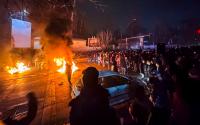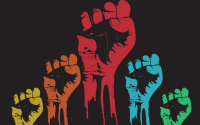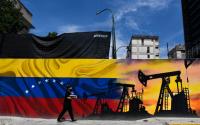Americans More Scared Than Ever
Published on Thursday, September 11, 2003 by the Toronto Starby Tim Harper
Two years on, the shock has dissipated, the memory is more distant, but the fear remains.
Poll after poll released on the eve of today's second anniversary of the terrorist strikes on New York and Washington find Americans more fearful and fatalistic than they were a year ago, when the need to honor the victims supplanted the recurring vision of another attack.
Everything else which spiked upward in the immediate aftermath of the Sept. 11, 2001 suicide hijackings — support for the government, a return to religion, even a trust of the media — has returned to pre-attack "normals."
"Everything but the `new normal,'" says Carroll Doherty of the Pew Research Center."The prevalent view in this country is that they can strike again, anywhere, anytime, and the government can't stop it.
"The apocalyptic fear is definitely here to stay, at least in the foreseeable future."
That fear returned yesterday when the Arabic television channel Al-Jazeera aired a video of Al Qaeda leader Osama bin Laden and his deputy Ayman al-Zawahri, who vows to "bury" American troops in Iraq.
If Americans are fearful, says Harper's magazine editor Lewis Lapham, a leading American commentator, it's because they are being sold fear by the government of George W. Bush.
"Pretty well all the Bush administration has got going for it now is this foreign war," Lapham said. "Fear is something this administration has been selling for two years.
"You sedate the populace with the drug of fear and maybe the electorate won't notice what a mess you have made, not only of domestic politics, but also our international relations.
"In order to conceal, disguise, dress up their own incompetence, they beat the constant threat of war and fear."
Bush took that message of fear with him yesterday in a speech at an FBI training Center. in Quantico, Va., where he called for expanded police powers against suspected terrorists.
In so doing, Bush appears to have picked up the torch from his attorney-general, John Ashcroft, who has been accused of trampling civil rights in a growing national debate over his USA Patriot Act, which was passed after the 2001 attacks.
"The enemy is wounded but still resourceful and actively recruiting and still dangerous. We cannot afford a moment of complacency," Bush said.
"The memories of Sept. 11 will never leave us. We will not forget the burning towers and the last phone calls and the smoke over Arlington.
"And we will never forget the servants of evil who plotted the attacks. And we will never forget those who rejoiced at our grief and our mourning," Bush said.
Bush immediately drew the ire of the American Civil Liberties Union for using the tragic anniversary of more than 3,000 deaths to promote tougher police measures.
Lapham said it was just another example of the marketing of terror.
"That's what Ashcroft is doing," he said, "going around the country promoting the USA Patriot Act, saying, `There's a terrorist on everybody's block and unless you give us these Draconian powers, the bogeyman is going to come and get you.'"
"You know, the last two years they've been putting up these warning flags, like heavy surf at the beach. Blue, red, yellow, whatever it is.
"The American public is sophisticated enough to know that there are terrorists in the world and the world is a dangerous place. But it has been dangerous for many years."
Still, when the New York Times and CBS News polled 976 New Yorkers Aug. 31 to Sept. 4, they found more residents are fearful of another attack or report feeling more nervous or edgy than they did a year ago.
Tom Riehle, president of Washington-based Ipsos-Public Affairs, in a poll done for the Orlando Sentinel, found 91 per cent of Americans doubt terrorism will ever be eliminated.
The current Pew survey also found terrorism concerns reached a peak in February, shortly after the terrorist warning was raised to a Code Orange — the so-called "warning flags" Lapham refers to — perhaps indicating the government is sowing fear itself.






